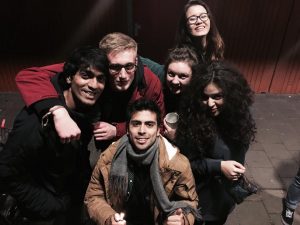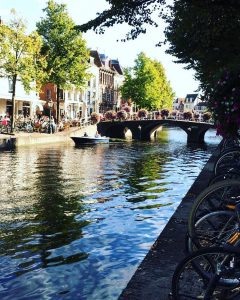Reflections on Judith Butler and Kinship Trouble.
Last Wednesday I had the chance to travel to London for the 2017 Housman Lecture given by Professor Judith Butler, hosted by the Department of Greek and Latin, UCL.
For those not familiar with her work, Professor Butler is perhaps best known for her ground-breaking work in Gender and Queer Theory, and has published much on these topics over the past three decades, as well as on psychoanalysis, power structures and identity politics.
The lecture was called “Kinship Trouble in The Bacchae”, a discussion of what we mean by “kinship”, how we form/break kinship bonds and, to keep in theme with the lecture series, how we can see these bonds and roles played out in Greek tragedy.
The lecture is available to stream (https://www.youtube.com/watch?v=ixwrw0PMC8I), and it is well worth watching if you get the chance, so I won’t repeat the content here, but there are a couple of things that, I think, are worth reflecting on.
Firstly, though it does not relate to the lecture directly itself, it was important the way in which Butler began by pointing out the fact that the lecture had been scheduled to be in a room with no disability access. There is a particular irony here, given Professor Butler’s lifelong work on bodies and how they affect identity politics, and the fact that she is a major influence on Disability Studies as a discipline. The room situation was not originally the case, but the university moved the lecture on account of so many people booking tickets. ‘Room for more people’ doesn’t seem to me, however, a good enough reason to deliberately exclude others based on accessibility, contravening the Equality Act 2010. The room we were in looked quite newly built (or at least newly redesigned), so one wonders why the room was designed without access for everyone in mind? Universities and institutions will use the excuse of old buildings and old designs as the reason why they are restricted in how they can design their rooms, but, in all the constant building work and redesigns that happen on campuses (and I think of our own Armstrong Building, which has been a building site for as long as I have been here), this excuse seems somewhat lacking. Butler explained that though the room was out of her control, she had made opportunities to meet with those who had been unable to attend, over the following few days. But this is certainly something we should probably all be thinking more about in planning and attending academic events.
The lecture itself was then a tour de force of Butler’s usual style of questioning norms and structures we presuppose to be in place by showing that, often, they are only retroactively seen to have been there when they are broken, or at least pushed to extremes. Kinship is more than just a biological, familial bond, a fact particularly prevalent in structures of ‘queer kinship’, but how far does it go, and why is it always necessarily so fragile? At what point does one become ‘kin’, and what effect does that have on the way we treat others? The lessons that Butler brought from Greek tragedy, particularly Euripides’ Bacchae, was that they make it evident we need laws about and knowledge of kinship, and kinship boundaries, in order to not commit violent acts against kin. But this opens a whole new set of questions, not least leaving us wondering if that, then, means it is okay to commit violent acts against non-kin; similarly, when we look at the number of domestic abuse cases, and the statistics of crimes committed by family members and loved ones upon each other, does knowledge of kinship really stop violent acts?
The title of the lecture was obviously referencing to Butler’s seminal first monograph, Gender Trouble (1990), and indeed the concept of kinship got the level of treatment given to the concept of gender in that earlier work. But what I found particularly interesting was the way Professor Butler brought the conclusions of these two lines of questioning. Gender Trouble has a feeling of dissatisfaction of the social structures that pervade and restrict certain people through enforcing conformation, and the lingering question of whether we really need them; “Kinship Trouble in the Bacchae” has a feeling of dissatisfaction at different social structures, but left the lingering question of whether we have a responsibility to operate and utilise those structures, extending the boundaries of “kin” to protect and help others on an immediate but also a global scale.
Chris Mowat,

 One. Pack well
One. Pack well





